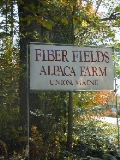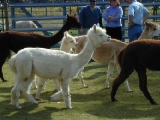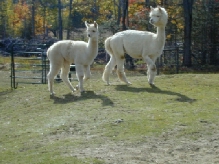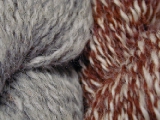
Road Trip:
Fiber Fields Alpaca Farm

Fiber Fields Alpaca Farm is an easy day trip from Portland, Maine, or even the Boston area if you get an early start.
Driving up the Maine coast along Route 1, you'll pass Bath (home of Halcyon Yarn), the scenic village of Wiscasset, and Damariscotta (home of Pine Tree Yarns).
The road leading to Fiber Fields Alpacas takes you through some of the most beautiful countryside in New England. I envy the animal that gets to grow up in such a setting.
At the Farm

Run by two dynamic and charming individuals, Dawn and John Brooker, the farm is tucked down a winding dirt road, set in a sunny clearing in the woods. Although the business is doing well, both Dawn and John are still reluctant to give up their "other" jobs: Dawn is a part-time dental hygenist, John is an electrician.
A Dream Come True
Raising alpacas is a dream they hatched together over five years ago. "We wanted a business that would support us both. We knew we wanted to raise animals, but we weren't sure what type," Dawn explained.
"We wanted animals that didn't need a lot of acreage, that either John or I could handle alone, that weren't always at the vet, and that wouldn't challenge the fences." She added, "Plus we didn't want to enter a market that was already saturated."

"They're wonderful animals, they're easy to care for, and I really liked that we wouldn't have to sell them for food. Plus, the alpaca market isn't yet saturated. In fact there are only about 25,000 alpacas in the United States."
Let the Work Begin
Once set on raising alpacas, they spent a year researching the animals and setting up their farm. John singlehandedly cleared all the woods for pastures.
Dawn's mother was also at the farm the day I visited and gave her perspective on her daughter's venture. "I really did think they were crazy at first," she laughed.
"Alpaca? What in the world is that? But once I started coming over and spending time with them, I was hooked." Dawn and John have established a support network of neighbors, friends, and family to keep an eye on the animals when they're away at work.
The First Family

Ironically, the llama is the only one they've had to worry about. Apparently he has a tendency to get loose and run through the neighborhood.
The Latest Addition
 While we were talking, I kept being distracted by an adorable two-and-a-half-week-old chia named "El Regalo" who was clumsily stumbling around trying to get his mother's attention. Alpacas have a gestation period of 11 1/2 months, making new arrivals a big event.
While we were talking, I kept being distracted by an adorable two-and-a-half-week-old chia named "El Regalo" who was clumsily stumbling around trying to get his mother's attention. Alpacas have a gestation period of 11 1/2 months, making new arrivals a big event.
The Send-Off
Both Dawn and John are extremely careful about who buys their animals. "I absolutely won't sell one of my alpacas at a fair or show," Dawn told me. "Usually we'll have met with the person several times, and ideally I've even visited their farm to check out their setup."
They offter two types of alpacas: breeding stock and fiber stock. Breeding stock come from award-winning bloodlines and possess all the ideal breed traits -- and as you'd imagine, they come at a premium.
The rest of the gang are classified as fiber stock, or "pet-quality" alpacas. Not fit for breeding, they're less expensive and provide wonderful fiber, not to mention companionship.
Raw Materials
Fiber Fields Alpaca also sells raw and prepared fleece as well as spun yarns. The colors range from white to grey to chocolate brown, depending on the color of the animal from which the fiber was shorn.
 During my visit I acquired a batch of luscious grey alpaca for a fitted cable/moss-stitch vest pattern created for Dawn by a local designer. She also offers a particularly nice two-ply alpaca that's a blend of white and brown.
During my visit I acquired a batch of luscious grey alpaca for a fitted cable/moss-stitch vest pattern created for Dawn by a local designer. She also offers a particularly nice two-ply alpaca that's a blend of white and brown.
Learn more by visiting the Fiber Fields Alpaca Web site.
This article was originally published on November 9, 2000.


